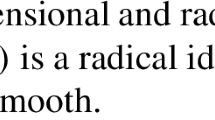Abstract
Matrix operations are some of the important computations in scientific and engineering domains. Parallelization approaches for such operations have been a common topic of research. One of the novel approach proposed during the 90s is architectures based on finite projective spaces. A key benefit of this approach is the communication efficiency that can be achieved by exploiting perfect access patterns in the architecture. Such spaces of dimension 4 appear suitable for matrix-matrix multiplication and are amenable for distributions with good performance potential. The construction of such 4-dimensional spaces with perfect access patterns, however, has been reported only for the smallest space – the one corresponding to prime 2. In this paper, we explore the construction for primes greater than 2. We compare two alternative methods for computational construction of such spaces, based on their efficiency. We present the successful construction of such a space for prime 3 and indicate directions for future work.
Access this chapter
Tax calculation will be finalised at checkout
Purchases are for personal use only
Similar content being viewed by others
Notes
- 1.
\(\upalpha ^4 =\upalpha * \upalpha ^3 = \upalpha * (\upalpha +1) \).
References
Amrutur, B.S., Joshi, R., Karmarkar, N.K.: A projective geometry architecture for scientific computation. In: Proceedings of the International Conference on Application Specific Array Processors, pp. 64–80, August 1992. https://doi.org/10.1109/ASAP.1992.218581
D’Azevedo, E.F., Dongarra, J.: The design and implementation of the parallel out-of-core ScaLAPACK LU, QR and cholesky factorization routines. University of Tennessee, Knoxville. Technical report (1997)
Grama, A., Gupta, A., Karypis, G., Kumar, V.: Introduction to Parallel Computing. Addison–Wesley (2003)
Karmarkar, N.: A new parallel architecture for sparse matrix computation based on finite projective geometries. In: Proceedings of Supercomputing, pp. 358–369 (1991)
Karmarkar, N.: Massively parallel systems and global optimization (2008). http://math.mit.edu/crib/08/Extended-abstract.pdf
Lin, S., Costello, D.J.: Error Control Coding, 2nd edn. Prentice Hall, Upper Saddle River (2004)
Sapre, S., Sharma, H., Patil, A., Adiga, B.S., Patkar, S.: Finite projective geometry based fast, conflict-free parallel matrix computations. https://arxiv.org/abs/1107.1127
Acknowledgements
The authors would like to thank Dr. B. S. Adiga for the many discussions on the concepts of projective geometry, and Prof Milind Sohani for the concepts of algebraic structure of the projective spaces.
Author information
Authors and Affiliations
Corresponding author
Editor information
Editors and Affiliations
Rights and permissions
Copyright information
© 2019 Springer Nature Switzerland AG
About this paper
Cite this paper
Sapre, S.N., Patkar, S.B., Biswas, S. (2019). Computational Issues in Construction of 4-D Projective Spaces with Perfect Access Patterns for Higher Primes. In: Malyshkin, V. (eds) Parallel Computing Technologies. PaCT 2019. Lecture Notes in Computer Science(), vol 11657. Springer, Cham. https://doi.org/10.1007/978-3-030-25636-4_20
Download citation
DOI: https://doi.org/10.1007/978-3-030-25636-4_20
Published:
Publisher Name: Springer, Cham
Print ISBN: 978-3-030-25635-7
Online ISBN: 978-3-030-25636-4
eBook Packages: Computer ScienceComputer Science (R0)




